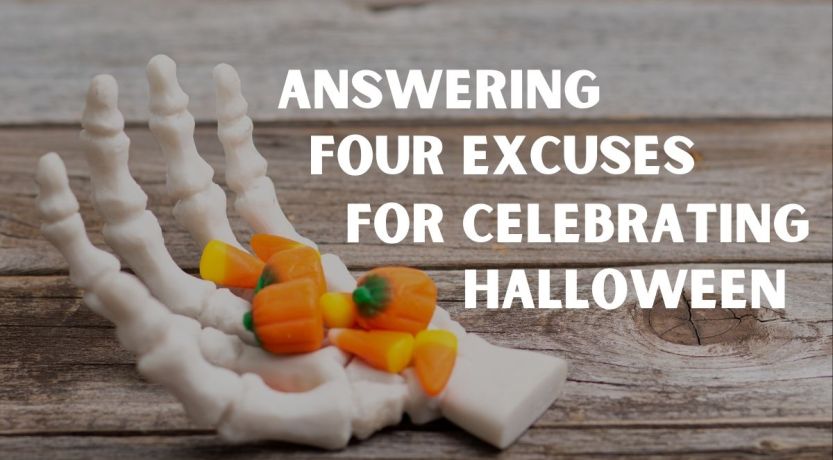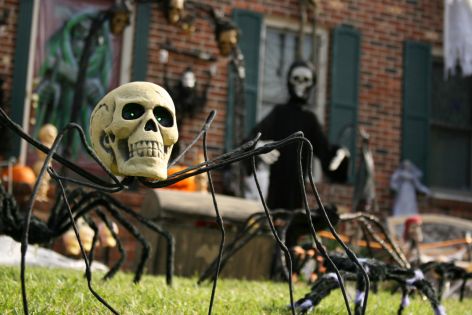Answering Four Excuses for Celebrating Halloween
Oct. 31, millions of Christians will celebrate Halloween. Why do people who claim Christianity continue to take part in this openly dark holiday?

Halloween is coming up, and amazingly, millions of people in the Christian world will celebrate this dark holiday—along with their children. People who profess to follow the teachings and example of Jesus Christ will put up gruesome images in their yards, tell terrifying ghost stories, watch horror movies and envelop their lives in darkness.
This horror-filled holiday, with its clearly dark origins and practices, should horrify Christians, right?
The popularity of Halloween
Unfortunately, many are neck-deep in it. According to a 2021 YouGov poll, 23 percent of Americans say it is one of their favorite holidays. An additional “two in five Americans say they like Halloween, but it isn’t one of their favorite holidays.”
This reinforces a 2015 LifeWay poll that found 54 percent of professing Christians say Halloween is “all in good fun.”
A CivicScience survey concluded that nearly two-thirds of American adults would celebrate Halloween in 2023. For a country where around 68 percent of adults identify as Christian, this should be the real horror!
Even comedian Drew Carey quipped at the irony of this at the 2002 White House Correspondents’ dinner: “There’s so many holidays we celebrate here in this country that have nothing to do with the Bible at all. Real famous holidays, like Christmas. Christmas has nothing—it’s not in the Bible . . . Halloween is another big holiday, a satanic holiday. Nobody’s bothered by that for some reason. You know, fun for the kiddies. I mean, when I was going to church, they always told me, you know, ‘Satan’s the most evil one. He’s the one you got to watch out for. Watch out for Satan.’ And then, once a year the whole country goes, ‘Hey, let’s party with this guy.’ It’s ridiculous.” (You can watch the video here.)
Why do professing Christians celebrate a holiday that is so obviously dark and evil? Let’s explore some excuses that are often used and consider if they are supported by the Bible.
Common excuses for Halloween
1. It doesn’t have to be celebrated as dark and evil.
As long as their children dress up for Halloween as superheroes, mermaids or any other bright and nice thing, most parents don’t see an issue with participation. Many reason that it’s okay, as long as their kids aren’t going as zombies, skeletons or the devil.
Halloween decorations are usually skeletons, ghosts, spiders, severed heads and limbs and other grisly things. 
Interestingly enough, though, people don’t decorate their houses with mermaids and superheroes, do they? The decorations are usually skeletons, ghosts, spiders, severed heads and limbs and other grisly things. Also, the movies that are marketed for Halloween are rarely about anything other than horror-filled themes, with evil spirits and jump scares.
No matter how good you try to make poison look, it is still poison and should not be ingested. A cute princess standing next to boy with a fake knife sticking through his bloodied head should not evoke a reaction of “oh, that’s innocent and normal.”
2. Well, when we dress up and trick-or-treat, we are really celebrating All Saints’ Day.
In case you’re not aware, the day following Halloween (Nov. 1) is All Saints’ Day. Catholics, Orthodox and some Protestant denominations use this day to celebrate all the saints who have died and supposedly gone to heaven.
No matter how good you try to make poison look, it is still poison and should not be ingested.
Both Halloween and All Saints’ Day originate from the ancient pagan Celtic festival of Samhain. Notice what History.com writes about this pagan festival (still celebrated by many Wiccans today):
“This day marked the end of summer and the harvest and the beginning of the dark, cold winter, a time of year that was often associated with human death. Celts believed that on the night before the new year, the boundary between the worlds of the living and the dead became blurred. On the night of October 31 they celebrated Samhain, when it was believed that the ghosts of the dead returned to earth” (History of Halloween).
The Catholics changed the celebration of the dead to the celebration of dead saints in heaven. But, as we see on Halloween, many of the dark themes have remained.
It doesn’t matter whether you are celebrating Halloween or All Saints’ Day—both have roots in ancient pagan practices that mainstream Christianity accommodated, despite the Bible warning us never to do this (Deuteronomy 12:29-32).
3. Halloween is fun for the kids, and even adults. Everyone else is doing it!
It is interesting to note that the Bible doesn’t have a verse that states: “Christ then said, ‘My followers will do things because everyone else is doing them. Blessed are the ones that do whatever they want.’”
Many Christians have already discovered that Halloween is not something Jesus Christ wants His followers to celebrate. Join us!
No, real Christians are to be different and have nothing to do with the “unfruitful works of darkness” (Ephesians 5:11), no matter how “fun” it looks.
Look up these two scriptures and think about the implications they have when it comes to Halloween:
- 1 John 1:5-6: “This is the message which we have heard from Him and declare to you, that God is light and in Him is no darkness at all. If we say that we have fellowship with Him, and walk in darkness, we lie and do not practice the truth.”
- Romans 13:12: “The night is far spent, the day is at hand. Therefore let us cast off the works of darkness, and let us put on the armor of light.”
Letting your daughter dress up like a cute princess is fun, but doing it on a night so tied to evil spirits and darkness is completely unnecessary. Children’s costume parties can be done any other time—at a time when people aren’t celebrating mutilation and terror.
The Bible urges us to have no association with darkness at all. Mixing fun with darkness is still darkness.
4. We aren’t Satanists! We just like dressing up and having a party.
Many professing Christians quickly label themselves as God-fearing, confidently reassuring others that they aren’t Satanists when it comes to Halloween. The mere fact that it has to be said says a lot about this excuse. But the issue isn’t whether you are a Satanist or not.
Here’s the issue: Do the practices of Halloween please God or not?
Do the following praise and honor God or, in reality, support the devil’s work?
- Celebrating a holiday that involves fear and evil spirits. A 12-year-old middle school student I once worked with told me he was going to his annual church Halloween party dressed as Chucky from the Child’s Play movies. I responded by asking, “You are going to a Christian church dressed as a demon-possessed doll that brutally murders people?” He responded by saying, “Maybe I won’t go as Chucky.” Try to imagine his descriptions of other costumes he had seen in previous years, as well as how he became so comfortable going as a murderous demonic doll.
- Decorating homes and yards with fearful, frightening things and images depicting evil spirits. Parents take their little princesses and superheroes to these frightening displays, bringing them into the consuming darkness that is Halloween.
- Watching scary movies of murder, death, fear and evil spirits. Kids’ movies at Halloween time are especially troubling. While mature horror movies at least attempt to portray evil as evil, children’s Halloween movies often try to portray dark characters as cute and funny.
Junk it now
Many Christians have already discovered that Halloween is not something Jesus Christ wants His followers to celebrate. Those of us who outright refuse to celebrate Halloween are small in number—only around 10 percent of the population, according to the 2021 YouGov poll.
We hope you’ll make the decision to join us in refusing to participate in this dark holiday!
Photo credit: iStock.com/ktaylorg
Date Posted: October 28, 2024



